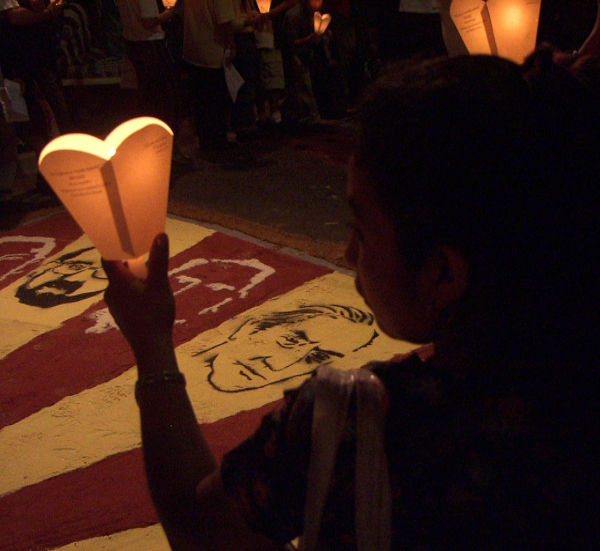He no longer has the same charisma or the same look as he did when he was part of El Salvador’s army élite. At 74, former colonel Inocente Montano is still tall, but as he comes to the special high court in Madrid (Audiencia Nacional) he seems stooped, frowning and tense. There is good reason, because he has just been extradited to Spain from the United States.
And, for the first time, a senior Salvadoran officer is to face justice in Spain for one of the most infamous massacres during the years of the "dirty wars" in central America: the assassination on November 16, 1989 of 6 Jesuits (of whom 5 Spanish), a Salvadoran cook and her daughter. This slaughter took place at the Central American University (UCA) of El Salvador, headed by Basque Jesuit Ignacio Ellacuría (one of the victims). It is presumed to have been carried out by a Salvadoran army unit as part of its fight against the Farabundo Martí National Liberation Front, the main opposition force up to 2009.
Out of reach
The former colonel then thought he was protected. Why? Firstly in the 1993 peace accords that ended 12 years of civil war (1980-1992), the national authorities took care to put a cloak of silence on the dark years. Secondly, thanks to a special visa granted at the time to Salvadoran nationals because of “natural disasters”, he was able to flee to Boston in the United States in 2001. There, Inocente Montano found work in a factory and really thought he was out of reach of jprosecution, despite the fact that during the years of repression against the FMLN and innumerable civilians, he was the number two at the Security Ministry. In other words, he was one of the army strongmen supporting the government of Alfredo Cristiani.
However, troubles were about to begin for Montano. In the years following his arrival in the US, the Massachussets Court discovered that his papers were false and worse, that the former colonel was said to be one of those responsible for 65 executions and 51 forced disappearances – all documented --, not to mention hundreds of arbitrary detentions and torture. It is nevertheless the 1989 murder of Ignacio Ellacuría and the five other Jesuits that remains at the heart of the case. Recently in Madrid, the accused admitted that there had been a top meeting in the presence of president Cristiani shortly before the killing. Montano insisted that he had not received any order to kill the Jesuits at the UCA. And he said, being vague what he was referring to, that “in any case” he had only followed orders.
Detained in the US
He was detained in the US in 2011. Montano still thought that he would get out of prison with no consequences. Why? Because in El Salvador, unlike other countries with a past of repressive dictatorship (e.g. Guatemala, Argentina, Chili), the authorities have not tried to put an end to impunity for the bloody years, even if in March 2017 the Supreme Court finally overturned the amnesty law. In total, only about half a dozen low ranking army members have been prosecuted by the national courts. It is Spain that will finally bring the former colonel to justice. Spain has been a pioneer of international justice, but it is true recent legislation has curbed powers to act under universal jurisdiction -- except if the victims are Spanish. That is the case for five of the six Jesuits massacred on the UCA campus in 1989 by a military commando. Montano is accused of having led that commando. In the coming days in Madrid, he will have to give his account.





